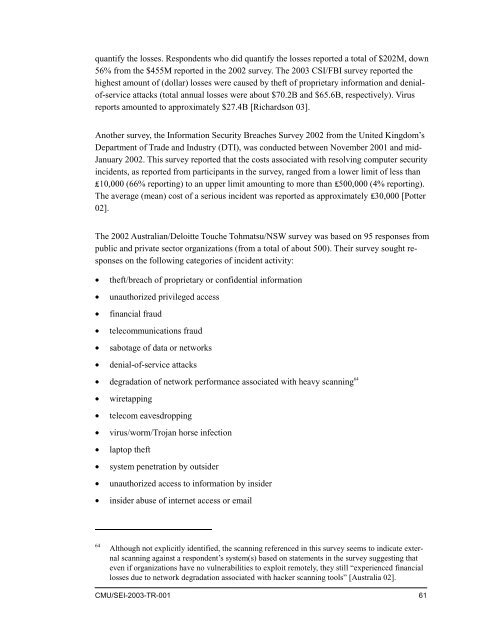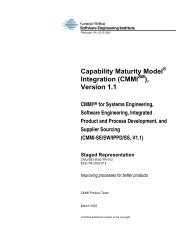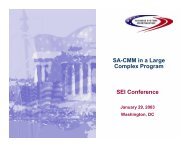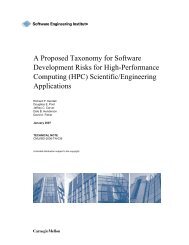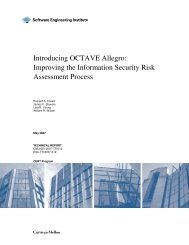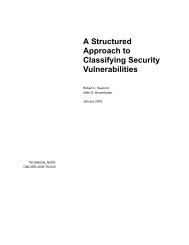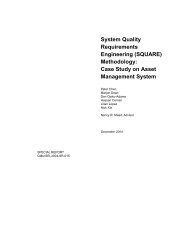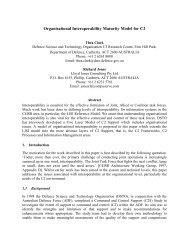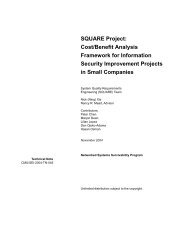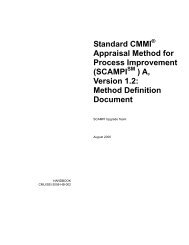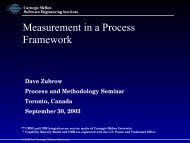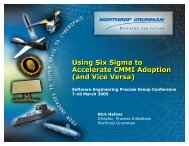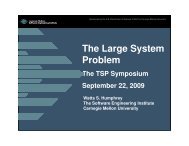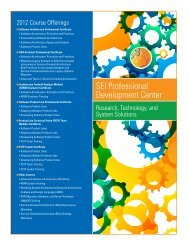State of the Practice of Computer Security Incident Response Teams ...
State of the Practice of Computer Security Incident Response Teams ...
State of the Practice of Computer Security Incident Response Teams ...
You also want an ePaper? Increase the reach of your titles
YUMPU automatically turns print PDFs into web optimized ePapers that Google loves.
quantify <strong>the</strong> losses. Respondents who did quantify <strong>the</strong> losses reported a total <strong>of</strong> $202M, down<br />
56% from <strong>the</strong> $455M reported in <strong>the</strong> 2002 survey. The 2003 CSI/FBI survey reported <strong>the</strong><br />
highest amount <strong>of</strong> (dollar) losses were caused by <strong>the</strong>ft <strong>of</strong> proprietary information and denial<strong>of</strong>-service<br />
attacks (total annual losses were about $70.2B and $65.6B, respectively). Virus<br />
reports amounted to approximately $27.4B [Richardson 03].<br />
Ano<strong>the</strong>r survey, <strong>the</strong> Information <strong>Security</strong> Breaches Survey 2002 from <strong>the</strong> United Kingdom’s<br />
Department <strong>of</strong> Trade and Industry (DTI), was conducted between November 2001 and mid-<br />
January 2002. This survey reported that <strong>the</strong> costs associated with resolving computer security<br />
incidents, as reported from participants in <strong>the</strong> survey, ranged from a lower limit <strong>of</strong> less than<br />
(66% reporting) to an upper limit amounting to more than (4% reporting).<br />
The average (mean) cost <strong>of</strong> a serious incident was reported as approximately [Potter<br />
02].<br />
The 2002 Australian/Deloitte Touche Tohmatsu/NSW survey was based on 95 responses from<br />
public and private sector organizations (from a total <strong>of</strong> about 500). Their survey sought responses<br />
on <strong>the</strong> following categories <strong>of</strong> incident activity:<br />
• <strong>the</strong>ft/breach <strong>of</strong> proprietary or confidential information<br />
• unauthorized privileged access<br />
• financial fraud<br />
• telecommunications fraud<br />
• sabotage <strong>of</strong> data or networks<br />
• denial-<strong>of</strong>-service attacks<br />
• degradation <strong>of</strong> network performance associated with heavy scanning 64<br />
• wiretapping<br />
• telecom eavesdropping<br />
• virus/worm/Trojan horse infection<br />
• laptop <strong>the</strong>ft<br />
• system penetration by outsider<br />
• unauthorized access to information by insider<br />
• insider abuse <strong>of</strong> internet access or email<br />
64<br />
Although not explicitly identified, <strong>the</strong> scanning referenced in this survey seems to indicate external<br />
scanning against a respondent’s system(s) based on statements in <strong>the</strong> survey suggesting that<br />
even if organizations have no vulnerabilities to exploit remotely, <strong>the</strong>y still “experienced financial<br />
losses due to network degradation associated with hacker scanning tools” [Australia 02].<br />
CMU/SEI-2003-TR-001 61


